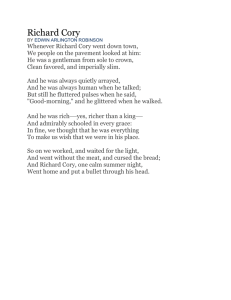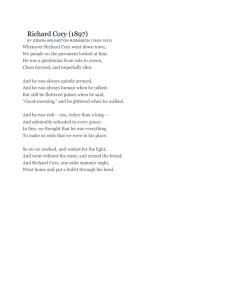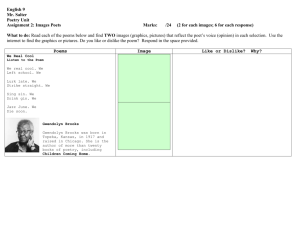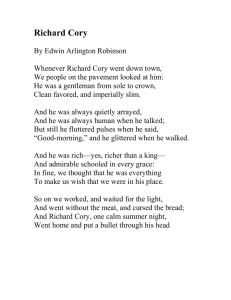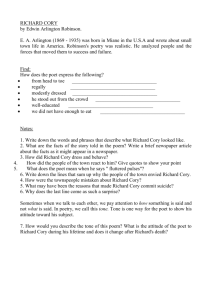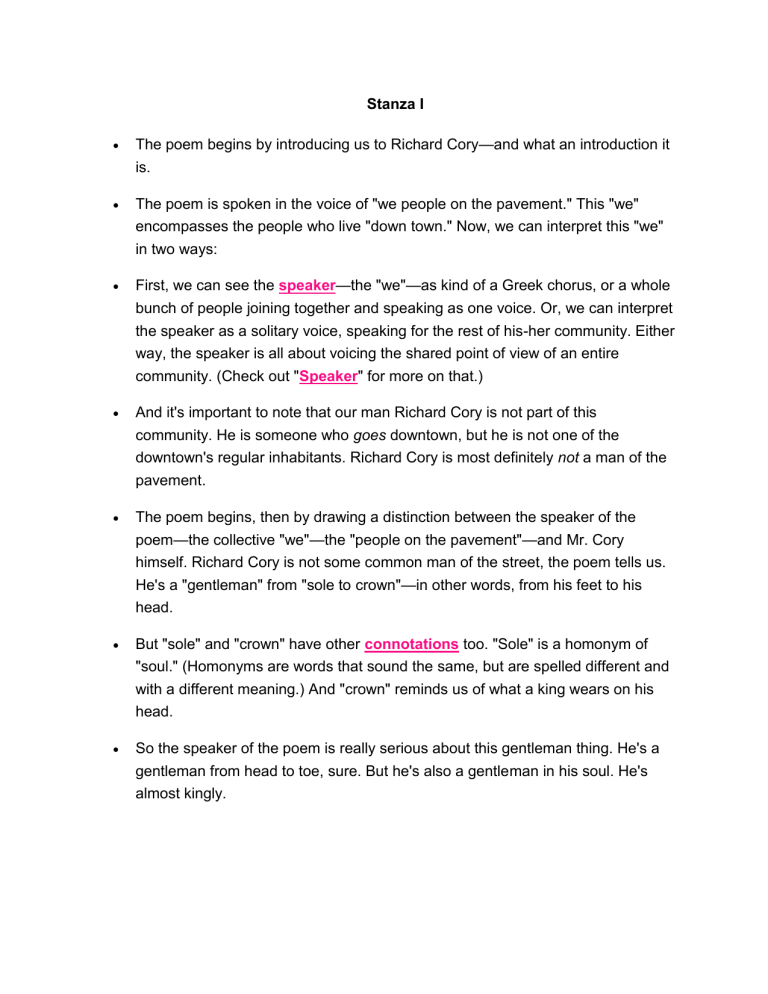
Stanza I The poem begins by introducing us to Richard Cory—and what an introduction it is. The poem is spoken in the voice of "we people on the pavement." This "we" encompasses the people who live "down town." Now, we can interpret this "we" in two ways: First, we can see the speaker—the "we"—as kind of a Greek chorus, or a whole bunch of people joining together and speaking as one voice. Or, we can interpret the speaker as a solitary voice, speaking for the rest of his-her community. Either way, the speaker is all about voicing the shared point of view of an entire community. (Check out "Speaker" for more on that.) And it's important to note that our man Richard Cory is not part of this community. He is someone who goes downtown, but he is not one of the downtown's regular inhabitants. Richard Cory is most definitely not a man of the pavement. The poem begins, then by drawing a distinction between the speaker of the poem—the collective "we"—the "people on the pavement"—and Mr. Cory himself. Richard Cory is not some common man of the street, the poem tells us. He's a "gentleman" from "sole to crown"—in other words, from his feet to his head. But "sole" and "crown" have other connotations too. "Sole" is a homonym of "soul." (Homonyms are words that sound the same, but are spelled different and with a different meaning.) And "crown" reminds us of what a king wears on his head. So the speaker of the poem is really serious about this gentleman thing. He's a gentleman from head to toe, sure. But he's also a gentleman in his soul. He's almost kingly. Stanza II Up next: well, we get more deets on Richard Cory. What else do you have to tell us about this guy, people of the pavement? Well, he was always "quietly arrayed," or, in other words, he was a low-key, but classy dresser. Also, he was "always human when he talked." So Richard wasn't obnoxious, or a braggart. He didn't look down on the townspeople, despite their obvious differences. Do you notice the repetition of "And he was always" at the beginning of lines 5 and 6? That kind of repetition is called anaphora. Anaphora gives this poem a sort of repetitive feel. There's just so much good stuff about Richard Cory that the speaker of the poem has to present it to us in a list. Despite his chill, friendly, and low-key manner, however, the poem tells us that Richard still "fluttered pulses" when saying hi to the downtown folk. Also, it tells us that he "glittered" when he walked. (We're going to go ahead and assume that the glittering here is a metaphor. We don't think that Mr. Cory is actually shining like some kind of Twilight vampire; he's just so attractive that he might as well be.) It sounds to us like everyone's got a crush on this dude. Pulses are fluttering and it seems like he's glittering. Guys want to be like Richard Cory, and girls want to be with him. He must be the luckiest guy in the world, right? Well, let's read on… Stanza III This stanza is gonna tell us even more about the dude. Not only is Mr. C. rich, he is "richer than a king." (Note again the comparison of our guy to royalty.) Also, take note of that casual interjection here, the "yes, richer than a king" that we find between those dashes. This moment gives us the feeling that we are being addressed directly by the speaker of the poem. They want to assure us that not only is Richard Cory rich, he is, in fact, super-rich—like, the Lannisters in Game of Thrones-levels of rich. Richie Rich levels of rich. We're talking… comfortably well-off. More great stuff about Richard Cory: he was "admirably schooled in every grace." He's polite, and he knows how to work a room. (Note that "And he was…" anaphora again; there's so much great stuff about R.C. that our speaker has to put all that stuff in list form.) The speaker then tells us that "in fine" (or "in sum") they "thought he was everything." This guy had good looks, good graces, money to burn—the works. And not only did he have everything, they thought he was everything. And, of course, everyone wished that they were in his place. And can you blame him? We mean, who wouldn't want to be Mr. Awesome? Stanza IV In this final stanza, the poem turns attention away from Richard Cory himself and toward the community of down-towners. And what do these people do? Well, they work—and work and work. Note that we never see Richard Cory working. It seems to us that Richard Cory has some family moolah, not that he's a hardworking businessman. The poem then draws further distinctions between Ol' Richie Rich and the "we" of the poem. The downtown folk are poor. They survive without meat, and they curse the bread that makes up most of their daily diet. What's more, these townspeople are "wait[ing] for the light." There are a couple of ways we can interpret this phrase. Are they waiting for daylight because they are working at night? Possibly. Or are they waiting for the light in a more metaphorical sense—perhaps waiting for the loads to be lightened? Or perhaps they're waiting for their lives to get easier? Or are they waiting for the light at the end of the tunnel—that ultimate light that signifies escape, or even death (and then maybe heaven)? We think that this small moment is drawing upon all those meanings of light, actually. And while the townsfolk are tired and hungry and waiting for their lives to improve, the poem shifts back to Richard Cory, who we now see has lived a pretty darn privileged life in comparison to the people on the pavement. So whatever happens to ol' Richie Rich? Well, the poem tells us that "one calm summer night," Richard Cory "went home and put a bullet through his head." we did not see this coming. Richard Cory had everything: money, fashion sense, good looks, social graces—you name it. Plus, everybody loved him. Why would he kill himself? Nothing in particular seems to have gone wrong—it was a calm summer night, after all—and the poem doesn't provide us with any answers. The poem ends with a kind of bang (literally). Richard Cory commits suicide. The end. But of course, this ending raises more questions than it answers. What was wrong with Richard Cory? Was he depressed? Isolated from the townsfolk? Was he heartbroken? We just don't know. What we do know, however, is that all the money in the world couldn't make R.C. want to live—nor could his good looks, nor could the envy of the townspeople. Money and good looks aren't everything, guys. Further, the poem suggests that appearances can be deceiving. The poem ends on this shocking note: how could Richard Cory's exterior be so deceiving? How could the townsfolk not know what was going on inside? How could he appear so happy, so warm and lovely, if his mind was filled with such dark thoughts? Or, in other words: can you ever really know another person? "Richard Cory" seems to suggest a pretty grim answer to that question: Nope, not at all.
